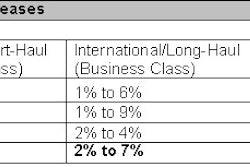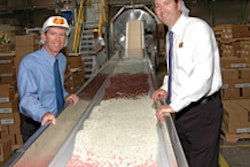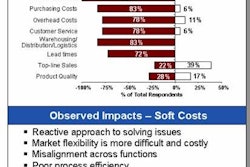Warren, NJ — October 31, 2008 — Consumer electronics, food and clothing are the three most stolen cargoes, and thefts of these and other items occur most often during the weekend, according to statistics compiled by the Chubb Group of Insurance Companies.
Chubb's statistical study also indicates that truck stops and rest areas are the most targeted locations for cargo thefts, accounting for more than one-third of all incidents, followed by modal yards and unsecured locations, such as drop lots and motel and restaurant parking lots.
"Cargo thieves are opportunists, and these statistics indicate where, when and how they are likely to strike and the type of goods they are likely to target," said Barry Tarnef, a marine loss control specialist for Chubb Marine Underwriters. "Although many incidents go unreported, cargo crime in the United States is estimated to cost businesses several billions of dollars per year."
Chubb compiled three-and-a-half years (from January 2005 through June 2008) of cargo theft data from the International Cargo Security Council, Transported Asset Protection Association, news reports and Chubb claims
Of the 1,316 cargo theft incidents compiled by Chubb, 52 percent occurred on Friday, Saturday or Sunday. Truck stops and rest areas accounted for 39 percent of the thefts; modal yards owned, operated or managed by trucking companies, railroads or steamship lines were next with 27 percent; and unsecured locations — drop lots, motel, restaurant and mall parking lots and on-street sites — were the locations for one-fourth of the thefts. Warehouse burglaries accounted for 6 percent, and hijackings represented 3 percent.
Consumer electronics — mostly televisions and DVD players — were stolen in more than 15.1 percent of the incidents, followed by food and food products (14 percent), clothing and footwear (10 percent), computers and related equipment (8 percent), metals (5 percent) and pharmaceuticals (5 percent).
Tarnef said businesses can take steps to help prevent cargo thefts, such as:
Chubb's statistical study also indicates that truck stops and rest areas are the most targeted locations for cargo thefts, accounting for more than one-third of all incidents, followed by modal yards and unsecured locations, such as drop lots and motel and restaurant parking lots.
"Cargo thieves are opportunists, and these statistics indicate where, when and how they are likely to strike and the type of goods they are likely to target," said Barry Tarnef, a marine loss control specialist for Chubb Marine Underwriters. "Although many incidents go unreported, cargo crime in the United States is estimated to cost businesses several billions of dollars per year."
Chubb compiled three-and-a-half years (from January 2005 through June 2008) of cargo theft data from the International Cargo Security Council, Transported Asset Protection Association, news reports and Chubb claims
Of the 1,316 cargo theft incidents compiled by Chubb, 52 percent occurred on Friday, Saturday or Sunday. Truck stops and rest areas accounted for 39 percent of the thefts; modal yards owned, operated or managed by trucking companies, railroads or steamship lines were next with 27 percent; and unsecured locations — drop lots, motel, restaurant and mall parking lots and on-street sites — were the locations for one-fourth of the thefts. Warehouse burglaries accounted for 6 percent, and hijackings represented 3 percent.
Consumer electronics — mostly televisions and DVD players — were stolen in more than 15.1 percent of the incidents, followed by food and food products (14 percent), clothing and footwear (10 percent), computers and related equipment (8 percent), metals (5 percent) and pharmaceuticals (5 percent).
Tarnef said businesses can take steps to help prevent cargo thefts, such as:
- Thoroughly screen prospective employees. Some cargo security experts maintain that a high percentage of cargo thefts involve inside information or complicity.
- Carefully select transportation partners and intermediaries. Remember that these companies have care, custody and control of goods once they leave your premises until they reach their destination.
- Establish a security culture within your company. Provide security training for employees, and educate truck drivers in hijack awareness and prevention.
- Factor in security when determining shipment routing. Cargo thieves often "case" known shipping points (plants, warehouses and distribution centers) and follow trucks as they depart, waiting for the drivers to stop so that they can pounce on the loads. Drivers should not be allowed to stop in the "red zone" (the first 200 miles/4 hours from their starting point) as well as known hot spots.
- Incorporate counter surveillance into the duties of security guards, and have guards patrol away from perimeters.
- Take advantage of technology. Vehicle and shipment tracking, vehicle immobilization and advanced, high-technology security seals are now available at lower cost.
- Conduct periodic security audits. Operations and personnel change, and criminals are always harvesting fresh ideas and modifying previous techniques.














